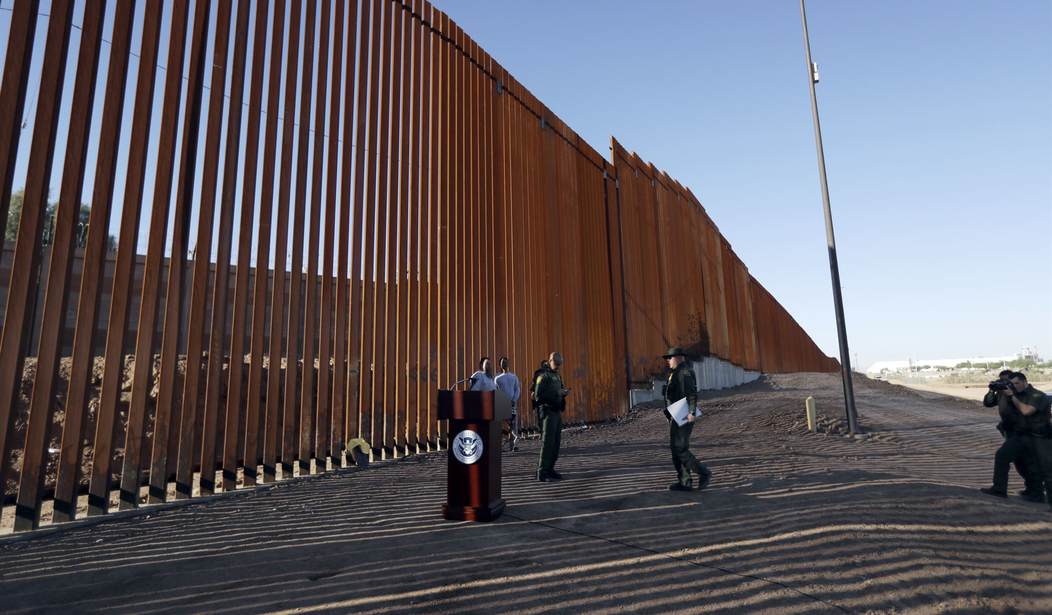Since President Trump announced his candidacy for President of the United States in 2015, and mentioned, for the first time, his intention to build a wall along the US-Mexico border, the wall has become one of the most politicized and divisive issues in our nation’s recent history. According to a Hill-HarrisX survey published last month, 34 percent of Americans said that a wall was "the best path for making America safer at its borders," while 31 percent said it was "totally unnecessary and not worth the expense." Nevertheless, the president’s took a major step in funding his wall this Friday by declaring a state of emergency which, coupled with the spending bill approved by the Senate late Thursday, would free up some $8 billion by diverting cash from Pentagon and Treasury funds.
But invoking Ford’s 1976 National Emergencies Act will inevitably throw the president, and Republicans, into a lengthy and heated legal battle. Democratic lawmakers have already announced their plan to introduce a joint resolution to terminate the national emergency. The power struggle that will ensue between the president and the Congress will surely delay any immediate action along the border, especially if the Judiciary gets involved.
But the president’s wall is not the only one that Americans should have their eyes on. At least not right now.
In Venezuela, despot Nicolas Maduro has erected a wall of shipping containers and water tankers along the border with Colombia, effectively preventing 50 tons of international humanitarian aid from reaching the starving and sickly Venezuelan people who, in the midst of the worst humanitarian crisis in their country’s history, have even resorted to taking medicine meant for their dogs. Maduro, however, claims that there is “no famine in Venezuela” and that international aid is nothing more than an imperialist “Trojan horse” meant to destabilize his regime. Aid will not enter Venezuela, swears Maduro.
Conversely, Interim President Juan Guaidó assured the crowd at the largest opposition rally since 2017 that the foreign aid amassed at the Colombian border would enter Venezuela by February 23, claiming that 300,000 Venezuelans could die if supplies do not reach them soon. His declaration means that “the armed forces will have a few days to decide whether to stand by the constitution and allow the entry of humanitarian aid.” That day, at least 35 people were killed by government forces and over 850 were detained. Maduro, however, still shows no signs of relinquishing power. As the Wall Street Journal reported, the government has “lined up dozens of convicts in orange jumpsuits from a nearby prison and vowed to use them to block the border" and “armed militia are standing by to use as sharpshooters against any opposition member who tried to cross [the border] with aid.” In the midst of high level Venezuelan military officers defecting, it will be telling to see what the 23rd brings. While the military remains loyal, for now, loyalties do indeed seem to be shifting.
Recommended
The Venezuelan military standing down and letting aid through could be equivalent to Harald Jaeger, the former East German border official, defying his superiors and allowing thousands of East Germans across the checkpoint into the West, effectively opening the Berlin Wall on November 9, 1989. Noting that sanctions only succeed in removing dictatorships about 30% of the time, the Venezuelan military’s siding with the people along the border (coupled with mass popular mobilizations across Venezuela) could be the straw that finally breaks Maduro’s back. After all, military support has allowed him to maintain power despite hyperinflation, mass food shortages, and inflation that is targeted to hit 10 million percent this year.
Personally, my views on walls are generally libertarian and are probably best reflected by the writings of the Cato Institute’s Alex Nowrasteh. Yet perhaps more so than my political ideology, my view of Maduro’s wall is defined by my family’s own experience with the Berlin Wall. My grandfather, refusing to bow to the Communist Party, was forced to leave East Germany to find a better future for his wife and children. Ultimately, it would prove impossible for him to return to East Germany and he never saw his family again. My father still remembers the desperate letters that my grandfather would receive, in Ecuador, from his children (my uncles), asking for fabric and basic food stuffs. I met my East German family years ago—they forgave my grandfather long ago, but maintain that communism destroyed their family and changed the course of their lives forever. For me, it’s hard to forget the 3 million Venezuelans who, since 2015, have been forced to make similar flights abroad and will one day have to tell similar stories.
While we, as a nation, debate the president’s border wall, we cannot forget the people of Venezuela and their struggle for freedom. Venezuela was once the most prosperous nation in South America and can surely be so again. With a return to democracy and free-markets, the people of Venezuela can bring their anthem to life, bringing “glory to the brave people who shook off the yoke” of despotism.

























Join the conversation as a VIP Member